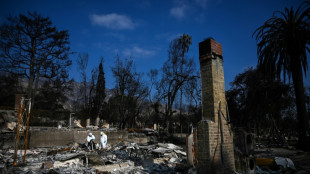

Indonesian islanders sue cement giant Holcim over climate damage
Residents of Pulau Pari, an Indonesian island threatened by rising sea levels, are suing cement giant Holcim over its carbon dioxide emissions, a Swiss charity said on Tuesday.
"Holcim... bears a significant share of the responsibility for the climate crisis as well as for the situation on... Pari," Yvan Maillard Ardenti, climate expert at Swiss Church Aid (HEKS), said on the charity's website.
The complaint was lodged on Monday with a conciliation authority in Zug, Switzerland, where Holcim's headquarters are located.
The four plaintiffs told German TV channel RTL on Monday they were seeking compensation from Holcim for damage already caused to their island by climate change, money for flood defences and a rapid reduction in the company's carbon emissions.
"Holcim is globally the leading manufacturer of cement, the basic material for concrete, and one of the 50 biggest CO2 emitters out of all companies worldwide," HEKS said.
This is in line with the 2021 greenhouse polluters index compiled by the University of Massachusetts Amherst, which ranks "LafargeHolcim" 47th among the top 100 emitters of climate-heating gases.
Contacted by AFP, Holcim, which merged with France's Lafarge in 2015, declined to comment on the legal case but said it "takes climate action very seriously".
"This is the first time that a Swiss company will be held legally accountable for its role in climate change," HEKS said.
The Swiss NGO is backing the islanders' campaign alongside the Berlin-based rights group ECCHR and Indonesian environmental pressure group WALHI.
They point out that countries of the South are bearing the brunt of a climate emergency mainly created by the rich countries of the North.
Large portions of Pari, which depends on fishing and tourism, were likely to be under seawater in 30 years, HEKS said.
Holcim sold its Indonesian activities to local cement maker Semen Indonesia in 2019.
But globally, it emitted more than seven billion tonnes of CO2 emissions between 1950 and 2021, according to a new study from the US-based Climate Accountability Institute.
That amounts to more than twice the emissions of Switzerland since the year 1750, HEKS said.
"We significantly reduced our footprint over the last decade and will cut it further by 2030," Holcim told AFP.
"We are focused on supporting our customers to build more with less to improve living standards for all while reducing emissions."
V.Reding--LiLuX



